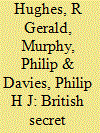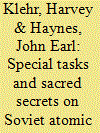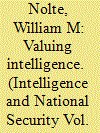| Srl | Item |
| 1 |
ID:
108626


|
|
|
| 2 |
ID:
108618


|
|
|
|
|
| Publication |
2011.
|
| Summary/Abstract |
Despite outward appearances, the CIA's evolution between 1945 and 1953 was influenced by two objective investigations - the Eberstadt Task Force and Dulles Commission - and was accelerated, but not instigated, by the shock of the Korean War. The role of these two investigations, which ultimately resulted in NSC 50 and the establishment of the CIA as a viable member of the US intelligence community, has been overlooked in recent literature. While these panels played a critical role in shaping the CIA's organization during this period, the Truman administration never achieved its goal of establishing a truly 'central' intelligence organization. This article examines the formation of the CIA, discusses both reports, national policy changes enacted in response, and relevance to the US intelligence community's current operations.
|
|
|
|
|
|
|
|
|
|
|
|
|
|
|
|
| 3 |
ID:
108624


|
|
|
|
|
| Publication |
2011.
|
| Summary/Abstract |
This article explores the official cover up of the mysterious disappearance of naval frogman Lionel Buster Crabb in 1956. Existing histories of the affair have tended to focus on the manner of Crabb's death, advancing a series of plausible and suitably implausible explanations. Using recently declassified sources, this article, in contrast, seeks to use the Crabb affair as a window onto government secrecy and relations between the press and the intelligence services. It is argued that the affair was a climacteric for the intelligence community and its relationship with Fleet Street, rupturing long-standing taboos about secret service work and bringing to the fore a brand of investigative journalist determined to make front-page news of intelligence shortcomings and failure.
|
|
|
|
|
|
|
|
|
|
|
|
|
|
|
|
| 4 |
ID:
108615


|
|
|
| 5 |
ID:
108619


|
|
|
|
|
| Publication |
2011.
|
| Summary/Abstract |
The Coder (Special) Branch was created to meet the needs of the Navy in gathering Russian language intelligence in the early years of the Cold War. It also supported a national signals intelligence effort coordinated by GCHQ. The article explores our recruitment, brief cryptography training, lengthy training in the Russian language, radio training, and our work in monitoring radio traffic at the radio stations set up in north Germany, first at Cuxhaven, later at Kiel. It concludes with a brief discussion of theIsis case at the central criminal court in London which arose from one of the first unauthorized discussions of these sorts of activities. This case ended with the successful prosecution of two former Coders for breaching the Official Secrets Act.
|
|
|
|
|
|
|
|
|
|
|
|
|
|
|
|
| 6 |
ID:
108623


|
|
|
|
|
| Publication |
2011.
|
| Summary/Abstract |
A careful review of the depiction of Soviet atomic espionage provided in Pavel Sudoplatov's Special Tasks and Sacred Secrets by Jerrold and Leona Schecter demonstrates how faulty memories, Soviet intelligence agency disinformation, sloppy citations, misplaced trust in documents provided by unidentified sources under unexplained circumstances, and egregious lapses in logic and judgment can lead to conclusions unsupported by evidence. The accounts of Soviet atomic espionage in both books are neither reliable nor credible. In particular, the assertions that Robert Oppenheimer, Enrico Fermi, and Leo Szilard consciously cooperated with and assisted Soviet atomic intelligence are without credibility.
|
|
|
|
|
|
|
|
|
|
|
|
|
|
|
|
| 7 |
ID:
108616


|
|
|